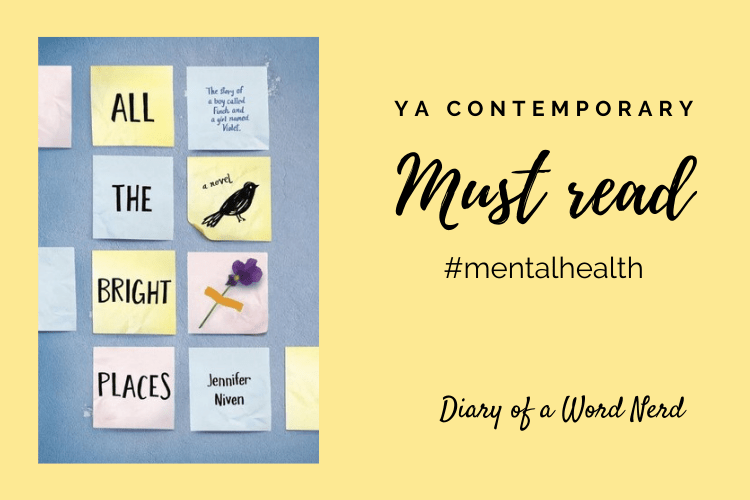Theodore Finch constantly contemplates ways to die. Yet, after he finds Violet Markey perched on the edge on the bell tower of his high school, he spends the next several months encouraging her to live. Will Finch convince Violet that life is worth living? More importantly, will he convince himself?
All the Bright Places is an older YA contemporary that won the Goodreads Choice Award in 2015. However, as we are still in the throes of the pandemic, and still reckoning with an increased awareness of mental health needs, All the Bright Places is an important read for our time. It explores depression and anxiety in compassionate yet real terms. If you are feeling depressed, you might want to hold off on this book. However, if you know someone who might struggle with depression, anxiety, or bipolar disorder, I consider it a must read.
The Premise
Theodore Finch’s classmates call him a freak. He’s prone to outbursts of anger and disappearing for long stretches of time. Finch is tired of everyone thinking he’s weird. He’s also tired of the strange forgetfulness and fatigue that sometimes overtakes him. He’s pretty much given up on life, until he meets Violet Markey.
Violet used to hang out with the popular kids and date the most coveted boy at school. She also used to have an older sister. But ever since a deadly car accident that took her sister away, Violet hasn’t felt normal, and she’s not sure she ever will.
After Finch stops Violet from throwing herself off the school bell tower, he won’t leave her alone. He seeks her out on Facebook and chooses her for his partner for a geography class project. Together, they embark on “wonderings” around the state of Indiana, looking for the remarkable in the every day. And slowly, but surely, Finch works his way into Violet’s life. But how long can he stay there?
What I liked
All the Bright Places thoughtfully explores depression, anxiety, the social challenges of high school, and first love. It’s characters are complicated and believable, and I came to adore Finch and his very strange ways. Bright Places does a good job of portraying depression both from the point of view of one struggling with this mental health challenge as well as someone trying to help. I’ve experienced mild depression, and I developed a greater understanding of more severe symptoms. The book also does a good job of depicting different levels of anxiety and depression. Violet’s symptoms are situational or reactive; Finch’s are chemical and much more serious.
What I didn’t like
At first, I didn’t like Finch. I found him a little strange and off putting. I think Jennifer Niven, the author of All the Bright Places, wanted it that way. As I got to know Finch, I gained greater appreciation for him, and I think that’s one of the powerful themes of the book – the value of making time to truly know the people around us, whether they are in our classes or in our own families.
Recommendation
If you are interested in reading/ learning more about depression and anxiety, I highly recommend this book. Warning: the Goodreads blurb for All the Bright Places describes it as heart-wrenching and compares it to The Fault in Our Stars. With good reason.
Have you read All the Bright Places? What did you think? Can you recommend other good books that explore mental health issues? I can also suggest Mosquitoland and Turtles All the Way Down.
Thanks for getting nerdy with me!





I absolutely loved this book and I have a few recommendations if you loved it too.
– Girl in Pieces by Kathleen Glasgow (Self-harm, suicide, addiction, depression)
– Paperweight by Meg Haston (Eating Disorder)
– Holding up the Universe by Jennifer Niven (Anxiety, depression, eating disorder)
These are all great books too but ‘All the Bright Places’ will always hold a special place in my heart.
Thank you Macy! All of these titles sound like books I would like to read. Thanks for the recommendations! 🙂 Julia
I am going to look for this book.
Depression and anxiety run in my family. The odd way of life practiced by some who experience those mood disorders is, for the most part, an attempt to move away from the pain. We all move away from pain: If we touch a hot stove, we pull our hand back. Mood disorders are psychological pain, and I can say from experience, that a person is likely to do just about anything to move away from that pain. If a person has a sore foot, he walks with a limp, yet people do not scowl at his limp, for they understand the reason for it. But when someone has a “life-limp” due to a psychological disorder, they are often condemned or, at best, considered weird. I do not blame folks for that; D and A are unknowable apart from the experience of them and even those of us who have experienced them have a hard time understanding them during those times when we are experiencing mental health.
The destructive aspect of this principle of avoiding pain is that the various means that most use to avoid the pain are not effective. Many seek out pleasure, for pleasure at least drowns out the pain for awhile. The problem is that whenever we seek pleasure, we eventually seek it in destructive ways. Pleasure is never a good goal; pleasure must always be the result of pursuing good things; it must never be an end in itself.
Alcohol and drugs (both legal and illegal) are also avenues used to deal with it. A psychologist friend of mine said that over 50% of alcoholics and drug addicts are merely self-medicating for D and/or A. The trouble is, even after the underlying issues are dealt with, the addiction remains.
Going through a couple of bouts of severe D and A have made me much less judgmental of others. I know why they “limp.” As a pastor/preacher, I have discovered that D and A are very prominent. While I do not shout it from the rooftops, I have never tried to hide my struggles. My own church has been very tolerant of the the quirks that arise from my D and A. When I have preached in other places and made mention of it, I am always approached by others who struggle with it but are afraid to be open about it. (So many have been told that Christians should never have such problems and that D and A are signs of unbelief.) There are a lot of them out there! Interestingly, until the advent of psychotherapy, D and A were considered health issues, not matters of moral weakness. Even the old names for these disorders bear that out. Depression was called “melancholy” for it was thought to arise from too much black bile, which is what melancholy means. Anxiety was called hysteria for it was observed to be a primarily female disorder so they assumed it arose from the uterus, and the Greek word for uterus roughly transliterates as hysteria. What they did not realize is that, in men, anxiety looks less like fear and more like anger.
John Newton, pastor and hymn-writer of Amazing Grace, had a companion in his hymn-writing endeavors, a man named William Cowper (pronounced “Cooper”). He suffered terribly from depression and anxiety, but his friend and pastor, John Newton, never judged him for it considering it to be a health issue. Cowper was poet laureate of England at the time. He and Newton wrote a hymnbook together. Some of Cowper’s hymns are stilled used” “There Is a Fountain Filled with Blood,” “O, for a Closer Walk With God,” and many others. But there is one that many quote, but only the first line. The common use of it shows that most misunderstand its meaning. But read the following hymn from Cowper’s pen from the perspective of one who felt himself to be slipping into another bout of depression, and it will takes on a whole knew meaning:
God moves in a mysterious way
His wonders to perform;
He plants His footsteps in the sea
And rides upon the storm.
Deep in unfathomable mines
Of never failing skill
He treasures up His bright designs
And works His sovereign will.
Ye fearful saints, fresh courage take;
The clouds ye so much dread
Are big with mercy and shall break
In blessings on your head.
Judge not the Lord by feeble sense,
But trust Him for His grace;
Behind a frowning providence
He hides a smiling face.
His purposes will ripen fast,
Unfolding every hour;
The bud may have a bitter taste,
But sweet will be the flower.
Blind unbelief is sure to err
And scan His work in vain;
God is His own interpreter,
And He will make it plain.
That is believed to be the last hymn that Cowper wrote. He did not use mysterious to mean spooky or eerily coincidental. Rather, Cowper thought it beyond human understanding that God could and would use such things as depression to bring about His good will. Mysterious, indeed!
If you like biographies, you might like “Lincoln’s Melancholy.” He suffered horribly from depression. The thesis of the book is not that Lincoln was a good president DESPITE his depression, but BECAUSE of his depression. Imagine someone trying to run for president today were it known that he suffered from depression!
And his depression likely helped make him one of the best American wordsmiths ever. I believe his Gettysburg address to be among the finest examples of American prose.
Well, another typically long comment from me. Do with it as you will! 🙂